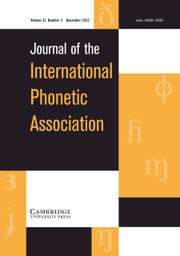Article contents
Updating the Theory
Published online by Cambridge University Press: 06 February 2009
Extract
The International Phonetic Association is not usually considered as a group of theoreticians. If the members have a self-image, they probably consider themselves as practical people, who apply their particular skills to real problems such as pronunciation teaching, speech pathology, the description of spoken languages, and speech recognition. They probably do not think of themselves as part of one of the very few organized groups in the world that promulgates an official theory about its subject matter. But that is precisely what the International Phonetic Association does. It sanctions an official set of symbols for representing the sounds of spoken language. By doing so it prescribes a certain way of describing sounds; the symbols are, after all, just symbols. They are shorthand ways of representing certain information, namely, the choices permitted by the phonetic theory.
- Type
- Revision of the IPA
- Information
- Copyright
- Copyright © Journal of the International Phonetic Association 1987
References
- 6
- Cited by




